Displaced and destitute
December 1, 2021
Texarkana has some of the most diverse people and problems in the world. This philosophy applies to the homeless population as well. In this three-part series, we take a look at the people and problems of the homeless.
Part 1: Michael and Chief
Duo’s adversity leads to living on streets of Texarkana
The warm autumn sun descends on an abandoned gas station off Seventh Street a little sooner than usual, letting the cool of night take over. On most nights a simple covering would work, but with the changing seasons, a thicker blanket is a necessity.
One man sits in a weathered wheelchair mumbling while looking for layers in his pile of belongings as another man rests stiffly on the concrete dreaming of earlier days in his life where he had a sense of peace, all while the street lights flicker on.
There is a drastic disparity in how people view those in less fortunate situations, yet with such convictions, many judge them only on their prejudices and not their stories. To understand their situation society must listen to those that are looked over, abandoned and berated: the homeless.
According to the US Department of Housing and Urban Development, 2.2% or 580,466 people are homeless in the U.S., with 27,229 of them being in Texas. Homelessness has now become a growing issue that has different outlooks. Nonetheless to dig deeper into the problem we shall look to those who experience it every day.
“Well, you know, I got busted up all through life, but it seemed like it didn’t bother me then,” David said. “I ended up out here because of that, old age and old wounds.”
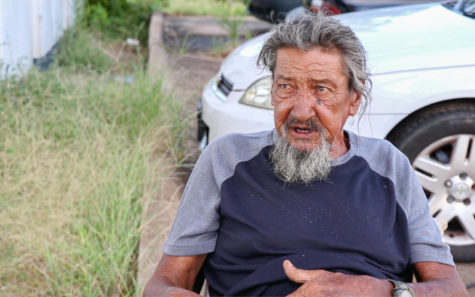
David, more commonly known as Chief, is a 68-year-old former truck driver who lost his leg and his ability to work in a trucking accident. He formerly lived in a nursing home but has been on the streets for some time. Accompanying him is 65-year-old Micheal, a veteran of the US military and has had an unfortunate streak of luck since his honorable discharge.
“I have been on and off the streets my whole life,” Michael said. “And right now, I get my Social Security and I get my VA benefits; I didn’t even look for the stimulus checks.”
Money is not only a sensitive topic for Michael and Chief but for most individuals in the homeless community as a whole. While the willingness to work may come into question some people simply can’t due to preexisting conditions.
“I was losing my sight, and I took up driving 18 wheelers, but I wrecked one of them and killed an ol’ boy,” Chief said. “I don’t have no income other than Social Security money, and what I get on there don’t really pan out to be able to rent a place, you know?”
Due to monetary issues, the pair stay in various and sometimes obscure areas to survive. The latest of which is the deserted remnants of an older gas station owned by the father of an Arkansas police officer.
“He knows we’re here, and I’ve been here about 12 years, right here,” Chief said. “We used to have a mobile home parked in the rear, then somebody stole it.”
Besides this instance, Chief hasn’t experienced any other fellow homeless violence, and he has expressed that they plan to seek a deal with the owner. Regardless of the fact that they have permission to be outside the building, they aren’t allowed inside during harsh weather.
“I just picked up a tarp and slicker suits,” Chief said. “If it will hold body heat, it’s good enough for me.”
The taboo topic of health care is another thing that the homeless population struggles to find. Severe medical conditions not only discourage them from going to the hospital in the first place but make these individuals feel as if the government does not have their best interests at heart.
“I got a hernia, liver disease, colon cancer, and they tell me I got a blood disorder like hepatitis C,” Chief said. “I have Medicaid, but that don’t impress them people. Plus, I got so many different things wrong with me I think they’re afraid to do anything.”
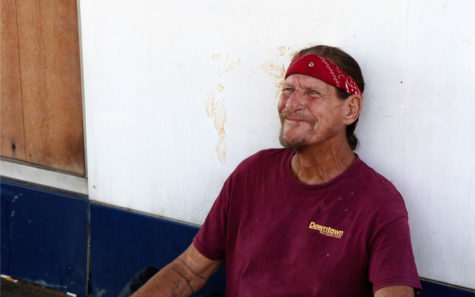
Harsh weather and health care are only some of the many complications for these two. Certain citizens in Texarkana are also a threat.
“It was a dark gray Mustang, and it was kind of a shabby-looking fastback,” Chief said. “They were running around Texarkana shooting people [and buzzards] with an air pistol, poor buzzards, and they hit me.”
Despite some mistreatment by the people in the community, Chief and Michael seem to keep a near positive outlook on how people from Texarkana treat them.
“Some treat me as I was kin, while some treat me like they hate my guts as if I was Satan or something, you know?” Chief said. ”I don’t pay much attention to other guys.”
Due to the stigma that surrounds their situation and the general behavior of others in their situation, Chief and Michael prefer not to mingle with many other people, which often leads them to be isolated. To raise their morale, there are groups of good Samaritans that make these individuals’ lives better.
“A lot of times they bring food, clothes, and they ask you if you need something else, but I say no. Yet, they go out and find something else to bring back to you, you know?” Chief said. ”God bless them.”
Part 2: Organized Efforts
Community works together to find solutions to homelessness
The kindness of one individual can be seen as an ever-present spark in the lives of those who have lost their fire. They can be catalysts in recovery as they have the ability to set ablaze the desire for change. All it takes is one good Samaritan to change a life and that is what these individuals, as well as organizations, have been doing.
The community in Texarkana is heavily diverse with its people and business ownership. These individuals have been in the town for years and have seen the landscape change, even when it comes to homeless people.
Howard Gustafson is the owner of Ragland Piano Company in Texarkana. He is a master piano craftsman, as well as a long-time resident of the city, and being a downtown business owner has allowed him to see these effects firsthand with homeless individuals in town.
“A good example would be Roy Malone, going back probably 20 years or so,” Gustafson said. “When I first met Roy, he was just kind of a fixture here in town, and once he gifted me a belt that had belonged to his brother, but Mr. Malone eventually passed away.”
Although Malone was known to stir up trouble on occasion, he had an unmatched presence on the town that was cut short due to his sudden death.
“We wound up having a [funeral] service that a lot of downtown business people went to, and the first person to speak was a prosecutor,” Gustafson said. “He showed up to the funeral service of an individual that he had numerous accounts with and he described it as he was the kind of guy that wasn’t bad to anybody except himself.”
Individuals in the same situation as Malone, however, don’t always have the same reaction to those circumstances. Gustafson has seen how some of the encounters aren’t so pleasant, but he has plenty of respect and faith in Texarkana’s police system.
“The Texarkana Police Department strikes me as doing a very good job with balancing the needs of these individuals with the needs of the businesses,” Gustafson said. “So anytime that we’ve got an issue with somebody negatively affecting the property here, we’re able to work with them to get that generally resolved.”
The government and its systems of support are the core pillars of the homeless situation in Texarkana. A persons’ ability to have faith in the system can be a determining factor in their economic situation and the man at the center of it all is Texarkana, Texas, Mayor Bob Bruggeman.
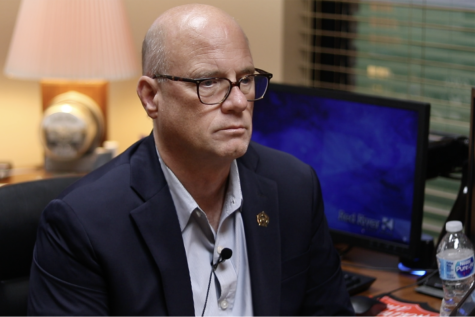
Bruggeman has been mayor for nine years and has seen the growth of the homeless epidemic in Texarkana.
“I think there’s more of a presence of homelessness in our city, and I think it’s more visible than it has been in the past because I see people walking along major thoroughfares, for example, Texas Boulevard,” Bruggeman said.
From Bruggeman’s perspective, Texarkana citizens should be wary before donating to these individuals. He has stated that not all of them are as they seem.
“Usually if someone asks me for money or something like that, I try to learn a little bit more about them, like ‘Where are you going or where are you staying? How are you going to use this money?’” Bruggeman said. “If you ask a few questions, sometimes it’s kind of like peeling an onion. You can kind of determine whether this person is truly needing help or if they’re just trying to take advantage of a situation.”
Besides the skepticism presented, Bruggeman still helps those in the homeless community not only as mayor but as an everyday citizen as well.
“I participate in the local food drives that take place,” Bruggeman said. “I’ve also donated personal items, clothing, furniture directly to the Randy Sam’s shelter.”
As the mayor, Bruggeman is able to tackle the problem of homelessness from multiple angles. He hopes that along with thoughtful philanthropy that the citizens of Texarkana will allow certain organizations to handle this problem.
“Someone may be hesitant to help someone [because] they’re not really sure if this person is homeless,” Bruggeman said. “We have these organizations within the city that will determine whether someone truly is homeless and fits the criteria to receive some assistance.”
When speaking of organizations that can help the homeless people, the Texarkana Homeless Coalition, headed by Vashil Fernandez, has plenty of programs to offer assistance.
“The Homeless Coalition serves as an umbrella agency or organization that brings all the other organizations together with a common goal of trying to end homelessness,” Fernandez said.
There are many different debates on the reasons for homelessness across the country. With so many different thoughts and ideals, solutions sometimes lose focus of the actual problem at hand. However, this doesn’t seem to be the case for this coalition.
“I believe a lot of stuff with our homeless population, not just here but all over, can be rooted down to mental illness,” Fernandez said. “And if we can get the resources to reach those people, then I think that will help alleviate a lot of the problem and help encourage people to get into housing as well as become self-sustainable.”
In an effort to combat the housing issue, the coalition has formed a program called Rapid Rehousing, where they try to get the homeless off the streets and into better living conditions.
“We pay rental assistance, some utilities, offer other services like life skills classes, bus tickets to get to and from work, just different things like that, as well as, offer things to help with people that are on medication,” Fernandez said.
The largest battle that the coalition has had to face recently is panhandling. Due to this practice, the issue of homelessness has become even more prevalent to the public, which hurts the Homeless Coalition’s core goals.
“[Panhandling] doesn’t deal with the underlying issue of why they’re out there,” Fernandez said. “Giving panhandlers a one-off donation doesn’t really help them. It might actually just cause them to stay in a situation they’re in.”
That’s why the coalition started Operation Responsible Compassion, which focuses on encouraging people to give in a more responsible way.
“If you’re giving to these agencies that are working on mental health, that are working on providing other life skill classes, that are working on feeding them, those are things that can contribute to helping with a person’s overall being,” Fernandez said.
These organizations can only provide so much assistance without one key thing–funding, something Fernandez said the coalition lacks. Despite this, he hopes that the homeless population will look to the coalition as a place to seek help.
“They should take advantage of all the resources that we have available,” Fernandez said. “The Texarkana Homeless Coalition is, along with all the agencies, there to help.”
Part 3: A Panhandler’s Tale
Drugs, healthcare contribute to life on streets; city ordinances try to curb handouts
Cars and pickups alike fly by the dull Texas street just as easily as the wind blows or sunlight falls down. Life is hard, sure, but the good heart of some people met during the autumn morning allows the day to take a turn in the right direction.
The charity some individuals of the community have shown has gone a long way in making the normal routine better, but the good Samaritans cannot solve everything. On the side of Seventh Street, a man and woman sit wearily after a prolonged day.
The sun has tanned the two to an earthy tone while the woman holds a sign reading, “Need money for food & rent; bless you.” The money they have received has allowed them enough to have somewhere to sleep, but that’s about as far as it will go.
The two are Regina and Joe. Regina is originally from North Carolina while Joe grew up all over the country as his stepfather was in the Navy.
“When I was little, we went from state to state for 20 years,” Joe said. “After that, I came back over here to Texas.”
While Joe came here at a younger age, Regina only decided to come to this part of the country due to a relationship. This, however, did not go as planned.
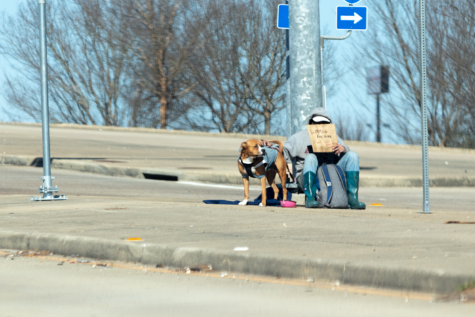
“I lived down here with my ex-husband who told me the world was beautiful down here and [had] so many jobs,” Regina said. “He lied so horribly.”
Jobs and finances have been an ever-growing issue in today’s economy. It has been an even more rough subject for those less fortunate.
“The main problem is finances. I get $794 a month on disability,” Regina said. “That’s really not enough to pay–by yourself–rent, power, water and everything else. There’s no way to do it, even in a one-bedroom apartment.”
The minimal opportunity available for disabled homeless individuals is coupled with the new Texas state anti-camping ordinances to provide an even more frustrating time for those in this situation.
“Just, truthfully, it is the most dangerous thing because now not only do you have the city ordinance of Texas, you have other people who are on drugs, who are trying to hurt you to take your stuff,” Regina said.
Another large problem within the community is drug addiction. This topic has directly impacted the duo in a series of ways.
“I’ll be straight up honest with y’all right now. I’m an addict,” Joe said. “The addiction is nothing fun, man. People think it’s easy. It’s hard to control yourself. It really is.”
Drugs have also resulted in the harm of many people in their community. Regina was attacked and obtained a broken wrist from an altercation.
“He attacked us in our camp, and I got in between the two of them,” Regina said. “He threw a brick in my face, and I blocked it and it cracked the outside of my wrist.”
Some individuals in the homeless community view drug abuse as a result of a greater problem, that being the inaccessibility of their formal medications.
“The sad part about that is that drugs are so easily accessible on the streets, and you can find a narcotic on the street faster than you can find antibiotics for people who need them,” Regina said.
The healthcare system is one of the leading institutions that have been shown to put people on the street. This time after time has been a common troupe in the stories of those who have found themselves in the aforementioned situation
“Before I got on Medicaid, two of my insulin is $1,000 a month, and that’s just two of my insulin, not counting the other 14 medicines I’m on,” Regina said. “If people had access to be able to get their medication, a lot of people wouldn’t be on drugs.”
The healthcare industry is only one of the larger institutions that affect the lives of homeless people every day. Another institution that plays a massive role in the lives of Texarkana’s homeless is the local police department.
“I think that a lot of those people that you see on the side of the streets, with signs are, to put it bluntly, looking to try to get money out of someone,” said Shawn Vaughn, Texarkana, Texas, Police Department Public Information Officer.
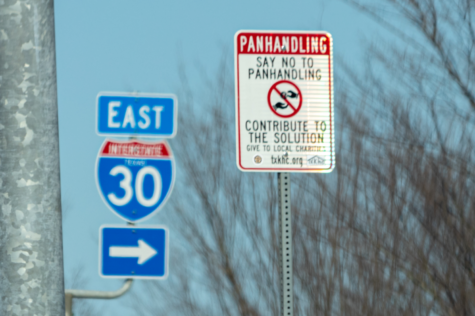
Vaughn has been in the police force for many years and has seen how the area has developed in terms of homelessness.
“I think that there obviously are homeless people in Texarkana, but the majority of the homeless that live in Texarkana are not the ones you typically think of in terms of the ones that stand on the street corner with their signs,” Vaughn said. “There’s a lot of people in Texarkana that live on the verge of homelessness or they’re living paycheck to paycheck.”
The financial burden on these individuals was more than present to Vaughn, However, he believes that resources are best given to the organizations in Texarkana as they are more suited to combat it.
“There’s a whole list of [organizations] right here in Texarkana, and they do an outstanding job, but actually handing [panhandlers] money really doesn’t do anything in terms of fixing the problem,” Vaughn said. “And you’ve got to ask yourself, ‘Are you handing them money to help fix their problem or make yourself feel good?’”
The availability of a good job program is a proven method to decrease the homelessness epidemic throughout America. Homeless individuals in Texas should follow suit in the way of their eastern neighbor, Louisiana.
“I honestly think that in the way Louisiana has a second chance opportunity program, most of Texas should have them too,” Regina said.
Second chance opportunities refers to the Second Chance Act legislation, reauthorized in December 2018 with bipartisan support, that created the National Reentry Resource Center, as well as funds to improve reentry outcomes to those who have been to prison nationwide.
“If people have options to get jobs, then they have options to help the economy which has the opportunity to turn over more money for the environment, the state and for the city,” Regina said. “I know it’s gonna be a long process to have that actually happen, but if we start now, we could possibly get it done.”

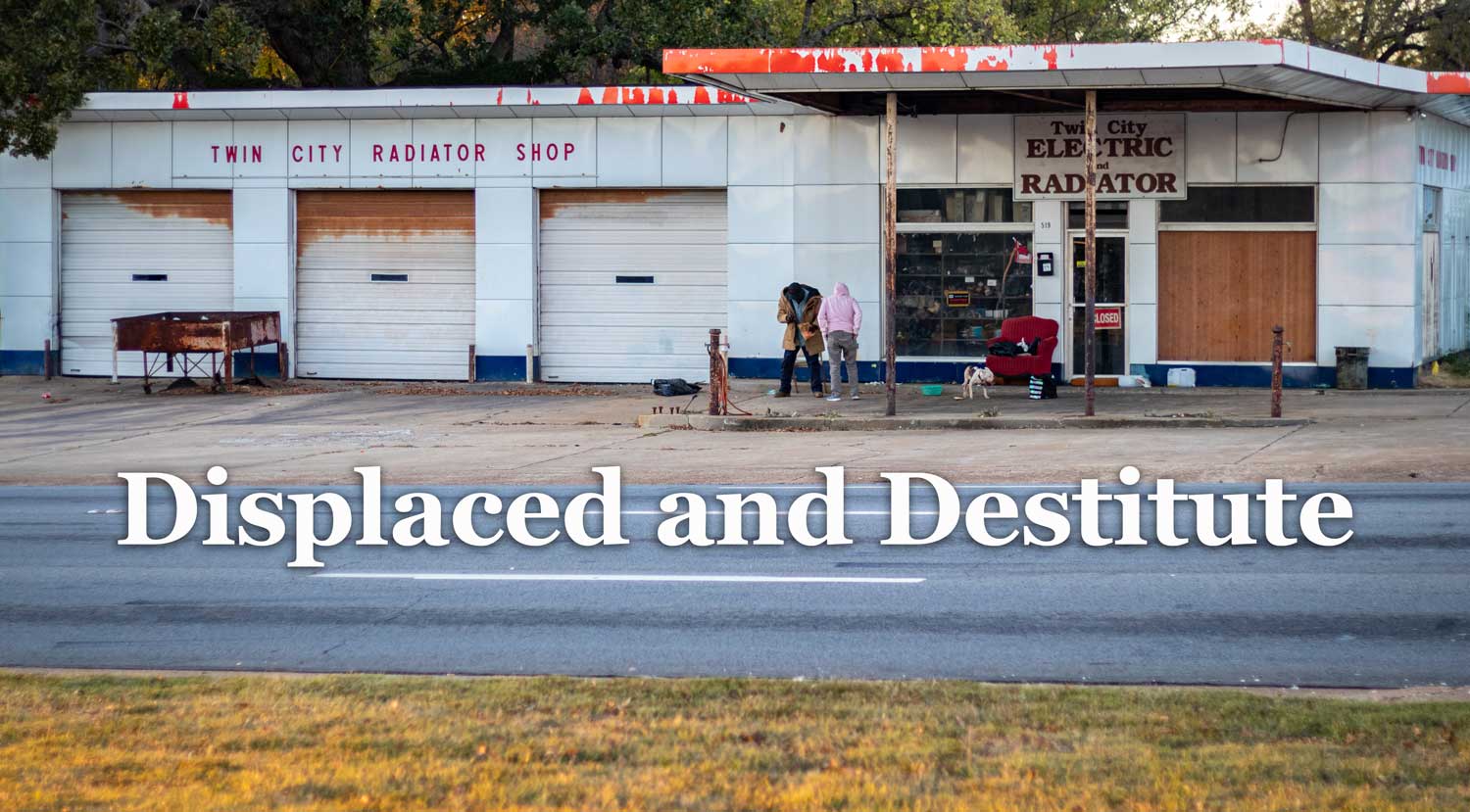
Paula Bhones • Jan 24, 2023 at 2:37 pm
Not everyone is on drugs and still there’s no help I’ve been homeless since Oct 22 I’ve applied for housing in September 22 and no one from there has said anything about it it’s cold outside ive lost everything because of the so called rent relief